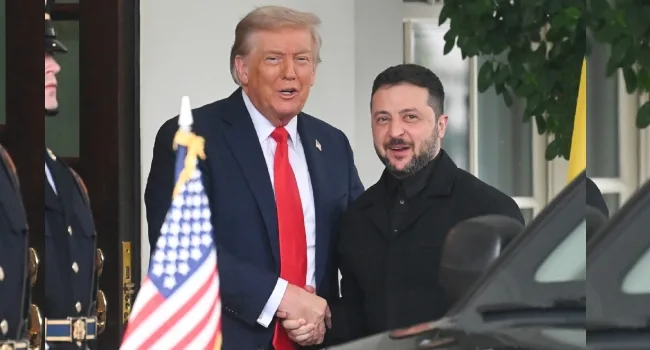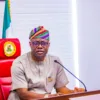US President Donald Trump expressed optimism Monday about brokering a peace deal between Ukraine and Russia, as he hosted Ukrainian President Volodymyr Zelensky for high-stakes talks at the White House.
The meeting marked the first encounter between the two leaders since a tense Oval Office exchange in February, and came just days after Trump held a surprise summit with Russian President Vladimir Putin in Alaska.
Despite deep divisions over proposed concessions—particularly Trump’s push for Ukraine to cede Crimea and abandon NATO ambitions—the US leader said there was a “good chance” of ending the war, which began with Russia’s full-scale invasion in February 2022.
Trump revealed he would speak with Putin by phone later in the day and floated the possibility of a three-way meeting with Zelensky and the Russian president.
“I think if everything works out well today, we’ll have a trilat, and I think there will be a reasonable chance of ending the war when we do that,” Trump said, seated beside Zelensky in the Oval Office.
Zelensky, flanked by top European allies, thanked Trump for his personal involvement in efforts to halt the conflict.
“Thank you very much for your efforts—personal efforts—to stop killings and stop this war,” Zelensky said.
In a show of unity, leaders from Britain, France, Germany, Italy, Finland, the European Commission, and NATO gathered at the White House. The European bloc has been wary that Trump’s recent overtures to Putin could signal a shift in US alignment.
Softer tone after past tensions
Monday’s atmosphere stood in stark contrast to the February confrontation, when Trump and Vice President JD Vance publicly scolded Zelensky for what they described as a lack of gratitude for US support.
This time, Trump opened the meeting with lighthearted remarks, even complimenting Zelensky’s trademark black military-style jacket—previously criticized by right-wing commentators.
“I love it,” Trump said, gesturing to Zelensky’s outfit as they shook hands at the West Wing entrance.
Despite the lighter tone, European leaders remain concerned about a potential shift in US foreign policy. Trump’s recent comments have echoed Kremlin talking points, including suggestions that Ukraine must forgo NATO membership and accept the loss of Crimea.
Still, Trump signaled that the United States would play a role in Ukraine’s post-war security.
“We’ll be involved,” he said, though he declined to specify whether US troops could be part of future security guarantees. “We’ll let you know that maybe later today.”
War rages on
As the talks unfolded in Washington, air raid sirens wailed across Kyiv, and Russian strikes overnight killed at least seven people, according to AFP journalists on the ground.
Earlier Monday, Zelensky held a preparatory meeting in Washington with European leaders and also met Trump’s Ukraine envoy, Keith Kellogg.
In remarks at the White House, Zelensky described the discussions as “very serious” and sought to appeal to Trump using his signature phrase:
“President Trump has that strength. We have to do everything right to make peace happen,” he said, echoing Trump’s “peace through strength” rhetoric.
Zelensky also posted on social media, calling for a “reliable and lasting peace for Ukraine and for the whole of Europe,” and confirmed that Western security guarantees were high on the agenda.
Reports indicate that Putin may be open to certain Western-backed guarantees for Ukraine’s sovereignty—provided Kyiv drops its NATO ambitions, a long-standing red line for Moscow.
Trump’s position draws scrutiny
Trump’s recent statements have alarmed both Kyiv and European capitals. On Sunday, he claimed Zelensky could “end the war almost immediately, if he wants to,” while declaring that Ukraine would not recover Crimea and insisting there would be “NO GOING INTO NATO.”
On Monday, he reiterated that he does not believe a ceasefire is necessary for peace negotiations to begin.
The talks, while cordial in tone, highlight the complex and high-stakes diplomacy surrounding the war—a conflict that has reshaped global alliances and tested Western unity.
AFP


